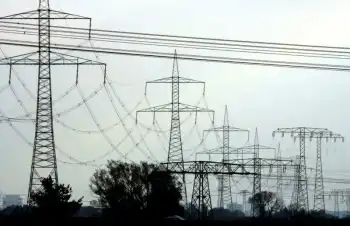Duke Energy Smart Meters enable remote meter reading, daily energy usage data, and two-way outage detection via AMI, with encrypted data, faster restoration, and remote connect/disconnect for Indiana customers in Howard County.
Key Points
Advanced meters that support remote readings, daily usage insights, two-way outage detection, and secure, encrypted data.
✅ Daily energy usage available online the next day
✅ Two-way communications speed outage detection and restoration
✅ Remote connect/disconnect; manual reads optional with opt-out fee
Say goodbye to your neighborhood meter reader. Say hello to your new smart meter.
Over the next three months, Duke Energy will install nearly 43,000 new high-tech electric meters for Howard County customers that will allow the utility company to remotely access meters via the digital grid instead of sending out employees to a homeowner's property for walk-by readings.
That means there's no need to estimate bills when meters can't be easily accessed, such as during severe weather or winter storms.
Other counties serviced by Duke Energy slated to receive the meters include Miami, Tipton, Cass and Carroll counties.
Angeline Protogere, Duke Energy's lead communication consultant, said besides saving the company money and manpower, the new smart meters come with a host of benefits for customers enabled by smart grid solutions today.
The meters are capable of capturing daily energy usage data, which is available online the next day. Having this information available on a daily basis can help customers make smarter energy decisions and support customer analytics that avoid billing surprises at the end of the month, she said.
"The real advantage is for the consumer, because they can track their energy usage and adjust their usage before the bills come," Protogere said.
When it comes to power outages, the meters are capable of two-way communications. That allows the company to know more about an outage through synchrophasor monitoring, which can help speed up restoration. However, customers will still need to notify Duke Energy if their power goes out.
If a customer is moving, they don't have to wait for a Duke Energy representative to come to the premises to connect or disconnect the energy service because requests can be performed remotely.
Protogere said when it comes to installing the meters, the changeover takes less than 5 minutes to complete. Customers should receive advance notices from the company, but the technician also will knock on the door to let the customer know they are there.
If no one is available and the meter is safely accessible, the technician will go ahead and change out the meter, Protogere said. There will be a momentary outage between the time the old meter is removed and the new meter is installed.
Kokomo and the surrounding areas are one of the last parts of the state to receive Duke Energy's new, high-tech meters, which are commonly used by other utility companies and in smart city initiatives across the U.S.
Protogere said statewide, the company started installing smart meters in August 2016 as utilities deploy digital transformer stations to modernize the grid. To date, they have installed 694,000 of the 854,000 they have planned for the state.
The company says the information stored and transmitted on the smart meters is safe, protected and confidential. Duke Energy said on its website that it does not share data with anyone without customers' authorization. The information coming from the meters is encrypted and protected from the moment it is collected until the moment it is purged, the company said.
Digital smart meter technology uses radio frequency bands that have been used for many years in devices such as baby monitors and medical monitors. The radio signals are far below the levels emitted by common household appliances and electronics, including cellphones and microwave ovens.
According to the World Health Organization, FCC, U.S. Food and Drug Administration and Electric Power Research Institute, no adverse health effects have been shown to occur from the radio frequency signals produced by smart meters or other such wireless networks.
However, customers can still opt-out of getting a smart meter and continue to have their meter manually read.
Those who choose not to get a smart meter must pay a $75 initial opt-out fee and an additional $17.50 monthly meter reading charge per account.
If smart meters have not yet been installed, Duke Energy will waive the $75 initial opt-out fee if customers notify the company they want to opt out within 21 days of receiving the installation postcard notice.
Related News












